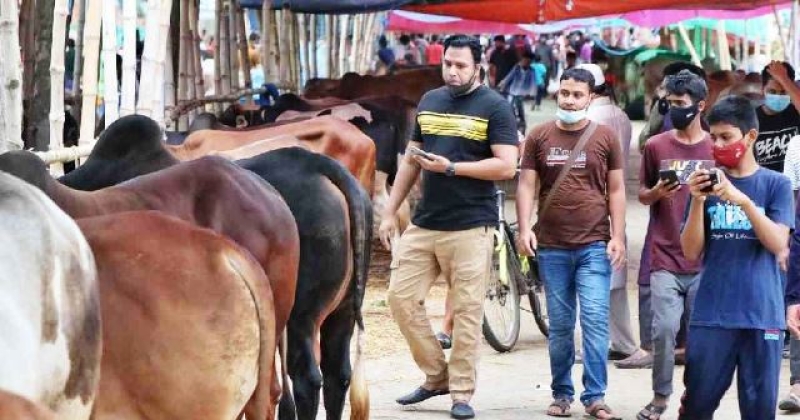- Hadi is no more, state mourning on Saturday: CA |
- Bangladesh capital market falls; weekly turnover lowest |
- Sharif Osman Hadi No More |
- Tarique Rahman to Return Home With Daughter on Dec 25 |
- ILO praises Bangladesh’s labour reforms, new milestones |
Khulna farmers have surplus of sacrificial animals for Eid

Sacrificial animal market on Wednesday
Khulna, May 22 – With Eid-ul-Azha on the horizon, farmers and livestock rearers across Khulna are in full swing preparing sacrificial animals amid market uncertainty.
This year, the supply has already exceeded local demand by 6,778 animals, highlighting both the region’s readiness and lingering concerns over market dynamics.
According to the Department of Livestock Services, a total of 1,63,063 sacrificial animals have been prepared in Khulna’s nine upazilas and metropolitan areas. This number surpasses the projected demand of 1,56,285.
While this indicates a well-prepared livestock sector, the surplus has notably decreased compared to last year, when 1,56,278 animals were available against a demand of 1,34,443—leaving a surplus of 21,835.
Political Change Linked to Shrinking Surplus
Stakeholders have attributed this decline in surplus to political changes that took place after August 5 of last year.
According to sources, many investors with affiliations to the previous ruling party pulled out of the livestock business following the shift in power, causing the shutdown of several commercial farms across the region.
Despite this, livestock officials remain optimistic. They say that in the event of an unforeseen shortfall, support from neighbouring districts would help bridge the gap.
Grassroots Still Leading Production
Most of the prepared animals have come from grassroots farms and individual households, which collectively raised 1,36,063 animals.
The breakdown includes 42,393 bulls, 12,040 oxen, 14,505 cows, 246 buffaloes, 79,583 goats, 14,202 sheep, and 62 other animals.
On an upazila-wise basis, Dumuria leads with 79,954 animals, followed by Koyra with 18,131, Terokhada with 12,833, and Dacope with 11,725. Other areas include Batiaghata (11,452), Dighalia (7,143), Paikgachha (6,429), Phultala (4,128), Rupsha (4,535), and the metropolitan region (6,733).
Health Concerns Cast Shadow Over Eid Preparations
Amidst the enthusiasm, fears are growing over a potential outbreak of Lumpy Skin Disease (LSD), a mosquito-borne virus that affects cattle. According to a February 24 report from the District Livestock Office, samples collected from 67 percent of the cattle population revealed infections in both indigenous and crossbred animals.
Farmers worry the outbreak may hurt buyer confidence, thereby impacting peak season sales.
Vaccine Shortage and Preventive Guidelines
Dr Md Sharif Ul Islam, Director of the District Livestock Department, said that last year’s vaccinations were effective in controlling the disease. But, this year, Tk 400 vials containing 16 doses each are unavailable at upazila offices due to supply chain issues.
In response, he urged farmers to follow best hygiene practices and consult veterinarians when needed. He strictly discouraged the use of steroid hormones or chemical enhancers in animal feed and advised against feeding poultry or broiler feed to cattle.
He also recommended ensuring adequate ventilation and natural light in barns, particularly for heat-sensitive breeds like Australian Friesians.
For such breeds, bathing two to three times a day is advised to prevent heatstroke, while other breeds generally require just one. Farmers were also advised to sprinkle water around barns and rooftops to maintain cooler conditions.
Premium Cattle Still in High Demand
Despite uncertainties, some farms are attracting buyers with high-quality animals. Kamal Hossain Sujan, manager of Bismillah Agro Farm in Gutudiar of Dumuria upazila, said their bulls and oxen are raised on balanced feed and without artificial enhancers. The farm currently houses 67 bulls, with prices ranging from Tk 60,000 to Tk 600,000.
Md Siddique, manager of M/s Purabi Agro Farm in Batiaghata, said their 20 sacrificial cattle are priced between Tk 1,50,000 and Tk 12 lakh, reflecting strong demand for naturally reared premium animals.
As Eid-ul-Azha draws closer, the region’s farmers remain hopeful that both the quantity and quality of their offerings will ensure a successful season, despite the looming challenges. - UNB

